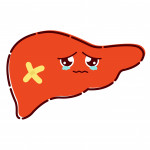The 2018 International Liver Congress (ILC) began yesterday in Paris. This annual meeting is hosted by the European Association for the Study of the Liver (EASL). It is an important event for liver specialists, and people gather from all over the world to share their latest findings. In the next week, I’ll post more frequently with highlights from some posters and presentations. (Note: Conference presentations represent part of the story and unless and until these studies are published in a peer-reviewed journal, these data and conclusions are considered preliminary.)
Abstract: PS-061 Cost-effectiveness analysis of hepatocellular carcinoma screening in hepatitis C cirrhosis after sustained viral response - H.F. Zangneh, et al.
Summary: Now that hepatitis C is curable using direct-acting antiviral agents (DAAs), guidelines for screening patients for hepatocellular carcinoma (HCC) by ultrasound after they have achieved a sustained virological response (SVR) need to be established. This Canadian study looked at the issue from a cost effective standpoint. They found that in patients who achieved SVR, HCC surveillance by ultrasound is likely to be cost effective in patients with hepatitis C-related cirrhosis, but not likely to be cost effective in those with advanced fibrosis who don’t have evidence of cirrhosis (e.g. METAVIR stage F3).
Editorial Remarks: I am not a fan of cost-effectiveness studies when they don’t work out in favor of patients. (Which means I’d make a lousy researcher.) I understand the value of these studies, but I have a hard time imagining myself conveying this information to patients or their loved ones. Fortunately one study does not dictate policy; more research is needed.
In the meantime, I’d like to remind people who are cured of hepatitis C but who had cirrhosis prior to treatment, or who have cirrhosis now, please be sure you are regular checked for evidence of hepatocellular carcinoma. Successful hepatitis C treatment does not mean you are safe from liver cancer.
Abstract: THU-428 Use of medications with clinically important drug-drug interactions with direct-acting antivirals for the treatment of chronic hepatitis C infection: Focus on ethinyl estradiol and HMG CoA reductase inhibitors - S. Corman, et al.
Summary: This retrospective study reviewed data for patients who were treated for hepatitis C virus infection using direct-acting antivirals (DAAs) in 2015. The goal was to assess the use of common medications known to cause drug-drug interactions in people on treatment. The medications that this study assessed were ethinyl estradiol-containing medications (including, but not limited to oral contraceptives) and HMG CoA reductase inhibitors (“statins”).
Researchers identified 38,917 Medicaid and 26,035 commercially insured hepatitis C-positive patients. Among females of childbearing age 9.4% of Medicaid and 17.5% of commercially insured patients received ethinyl estradiol-containing medications during the study period.
Approximately 15% in both males and females over age 45 years old who are insured by Medicaid used statins; in commercially insured patients, statin use was 14.4% and 10.9% in male and female, respectively. Since statins and ethinyl estradiol-containing medications are known to interact with hepatitis C DAAs, health care providers need to be cautious about the potential for drug-drug interactions.
Editorial Remarks: Before taking any medication, be sure to tell your health care provider and pharmacist about all the medicines, supplements, and substances you are taking.
Abstract: THU-403 Patient-reported outcomes in chronic hepatitis C: The impact of placebo, active treatment, and sustained viral eradication - Z. Younossi, et al.
Summary: This international study assessed quality of life and other patient-reported outcomes (PROs) during and following successful treatment of hepatitis C. There were 147 HCV subjects in this study; most were male (79 percent), white (82 percent), 33 percent had cirrhosis, and 99 percent had HCV genotype 1. The cure (SVR-12) rate was 97 percent. Half of the study participants were treated while the other half were given placebo for 12 weeks before undergoing treatment. The medication used to treat hepatitis C was Vosevi.
The placebo group basically reported no significant changes. The Vosevi group reported significant improvements in PROs shortly after beginning treatment and scores continued to improve until the end of treatment, with improvements noted at the post-treatment week 12 mark. This study provides strong evidence supporting the positive impact of HCV viral suppression on PROs.
Editorial Remarks: This is a very exciting study. However, it is small. I’d like to see it duplicated with a larger population and with all the other hep C treatments.
Stay tuned for more news from the 2018 International Liver Congress








Comments
Comments